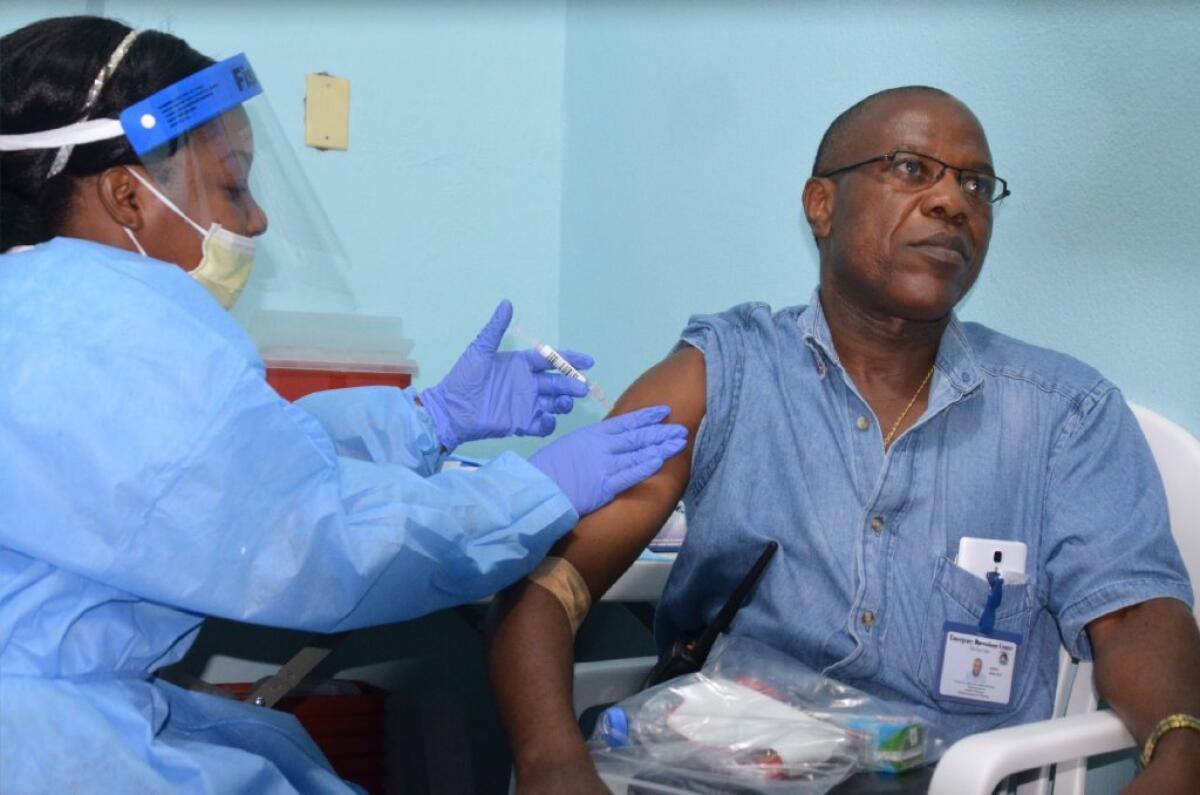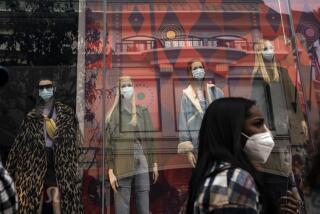New Ebola cases are declining: Why that’s bad news for a cure

- Share via
After killing at least 9,936 people and infecting more than 24,202, the Ebola epidemic appears to be running out of steam. And for some medical researchers, this hard-won progress poses a problem.
The Ebola virus has retreated so dramatically in recent months that it may be too late to determine the effectiveness of the many experimental drugs and vaccines that have been rushed into production.
Unless the outbreak explodes again, potential cures such as ZMapp can’t be given to enough patients to accurately determine their effect. Nor is the virus infecting enough people to let researchers test the efficacy of two potential vaccines that are being given to about 18,000 health and emergency workers in Liberia.
Even proposals to treat patients by transfusing into them blood serum from Ebola survivors have become impossible to test with scientific rigor.
“We just don’t have sufficient cases,” said Dr. Bruce Aylward, the World Health Organization’s point person for medical emergencies.
Already, pharmaceutical maker Chimerix Inc. of Durham, N.C., has canceled a trial of its antiviral drug brincidofovir. That trial was supposed to take place at an Ebola treatment center run by Doctors Without Borders in Monrovia, Liberia’s capital, but only a handful of patients enrolled in the study when it began on Jan. 2. Five months ago, the treatment center was among the nation’s busiest, but last week there were no new Ebola cases reported anywhere in the country.
Under normal conditions, it takes about 200 to 300 patients to conduct a preliminary Phase II trial to see whether an experimental drug appears to be helpful and safe. If it looks as though the drug works, its effectiveness is determined in a much larger Phase III trial, which traditionally involves 2,000 to 3,000 people, according to the U.S. Food and Drug Administration.
Those numbers are now hard to come by. And for some researchers, this turn of events is particularly frustrating. They had wanted to start testing some of these drugs months ago, when the outbreak was still spreading to more than 800 people per week.
Instead of getting trials underway, scientists spent months engaging in a heated debate over the best way to test whether any of these drugs worked.
“Sadly … it has been a missed chance,” said Dr. Piero Olliaro, an Oxford University infectious disease expert and official at the WHO.
On one side of the debate were top American medical officials from the FDA and the National Institutes of Health. They pressed for randomized controlled trials that would pit the drugs against dummy pills known as placebos, or against a monitored group of patients that received neither drugs nor placebo. These types of trials are considered the best ways to produce conclusive data about a drug’s disease-fighting capability.
But in the case of the latest Ebola epidemic — the biggest in history — a number of experts have argued that this careful approach is unfeasible and unethical. Some said it would be wrong to withhold potential cures from vulnerable patients. Others fear it would be practically impossible to conduct such a study in the most affected countries — Liberia, Guinea and Sierra Leone — because of suspicion over Western medical practices.
Dr. Richard Whitley, a professor of medicine at the University of Alabama, said that when he attended a WHO conference on experimental Ebola drugs, West African health ministers offered a clear message on the use of placebos.
“They vehemently said, ‘We’re not going to do placebo controls. Find another way to study your drugs in our populations,’” Whitley said during a recent Ebola symposium at Harvard University.
A special WHO medical panel agreed in August that it was ethical and necessary to offer experimental drugs to Ebola patients. The following month, the London-based Wellcome Trust, Doctors Without Borders and other nonprofit groups joined the WHO in announcing the launch of a fast-track initiative for evaluating investigational drugs without placebos.
But the academic debate continued. In October, Olliaro and 16 other health experts published a letter in the medical journal Lancet calling for quicker alternatives to randomized controlled trials. In November, top FDA officials argued for such trials at a session of the American Society of Tropical Medicine and Hygiene in New Orleans. And in December, they wrote in the New England Journal of Medicine that not using randomized controlled trials could have “tragic consequences.”
In the end, officials at the WHO and within the U.S. government opted for a mix of trial methods.
The two top vaccine candidates — one developed by GlaxoSmithKline and the National Institute for Allergy and Infectious Diseases, and the other from the Canadian government and Merck — are being tested against placebos in trials overseen by the NIAID. Study participants began receiving shots last month in Liberia.
The WHO launched a separate Phase III trial of the Canadian vaccine in Guinea on Saturday, with plans to test the NIAID vaccine when supplies are available. These trials will not involve placebos, however. Instead, medical workers will employ a “ring vaccination” strategy, similar to the one used to fight smallpox in the 1970s, according to the WHO. When a case of infection is identified, medical workers will vaccinate all of their contacts, if they are willing.
ZMapp, the drug made by San Diego-based Mapp Biopharmaceutical, will be tested somewhat differently. Two groups of patients will receive the highest available level of supportive care. But only one of the groups will get the drug. The trial launched in Liberia at the end of February.
FDA officials have argued that because effective supportive care greatly improves an Ebola patient’s odds of survival, even the control group of patients will experience better survival rates.
Another experimental Ebola treatment was tested in yet another way. In late December, doctors began offering favipiravir — an antiviral drug produced by Japan’s Fujifilm — to all new patients at a Doctors Without Borders treatment center in Gueckedou, Guinea. Their outcomes were compared with that of patients who were admitted to the facility before the study began.
The study was completed recently after enrolling about 60 patients, Aylward said. Although there have been rumors that the drug was effective, officials said the data are still being analyzed.
“It would be very premature to say the results are encouraging,” the WHO official said.
Indeed, it’s possible that none of them will yield the kind of data that will let researchers figure out whether any of these drugs or vaccines is effective.
“The wrangling over trial design has caused delay, thus allowing the caseload problem to arise,” Olliaro said.
Dr. Clement Adebamowo, a professor of epidemiology at the University of Maryland, is in the camp that says the insistence on randomized, placebo-controlled trials was misguided. One of the biggest problems was the amount of time needed to implement them.
“These acute infectious diseases have a short timeline,” said Adebamowo, who serves as director of the West African Bioethics Training Program in Ibadan, Nigeria. “We need to continue the conversation on how to do better next time.”
Follow me on Twitter @montemorin and “like” Los Angeles Times Science & Health on Facebook.







